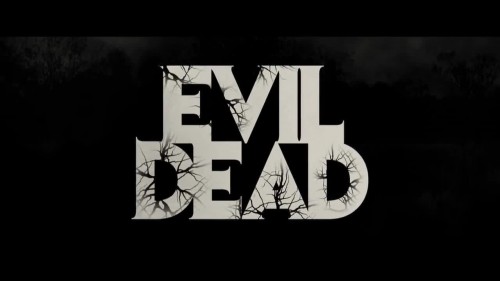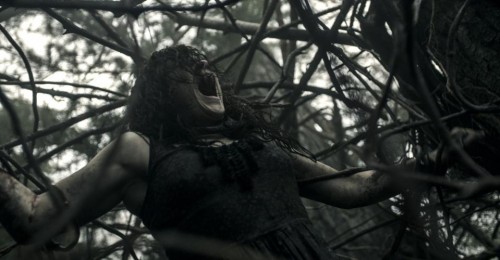
I used to be like “Why are we doing a remake? What are remakes being done for?” But then, we do that all the time in the theater. If we weren’t doing remakes, nobody would know who Shakespeare was. I’m not saying that Robocop is Shakespeare, but it’s a way to … we’re retelling. That’s what we do as human beings. We retell our favorite stories. That’s what we’ve done since we were sitting around campfires. It’s a part of the human spirit. It doesn’t have to be negative to creativity. It can be completely opposite. That’s how you can break new ground by rethinking something that’s already been done. – Joel Kinnaman (co-star on AMC’s The Killing) on remaking Robocop
 Last weekend I ventured into the dark, sacred space of the local movie theater to see the remake of one of the first horror films that caught my attention as a teenager and sparked my general interest in horror cinema, The Evil Dead (1981). There was much—justifiable—concern over the very rumor of such an endeavor, let alone the reaction that it would receive once it became a real, finished product. Some of that reaction was blunted by the knowledge of Sam Raimi’s (the original’s director) and Bruce Campbell’s (the original’s lead actor) role in the development of the remake and their overwhelming approval of the finished product.
Last weekend I ventured into the dark, sacred space of the local movie theater to see the remake of one of the first horror films that caught my attention as a teenager and sparked my general interest in horror cinema, The Evil Dead (1981). There was much—justifiable—concern over the very rumor of such an endeavor, let alone the reaction that it would receive once it became a real, finished product. Some of that reaction was blunted by the knowledge of Sam Raimi’s (the original’s director) and Bruce Campbell’s (the original’s lead actor) role in the development of the remake and their overwhelming approval of the finished product.
However, the mere presence of original cast and crew in making a remake or in continuing a series of films does not always necessitate a quality film—just look at the conflicted, at best, reviews that accompanied the second wave of Star Wars films even though Lucas was still attached to all of them. It does not help that The Evil Dead trilogy holds a hallowed place within the American horror cinema canon. There were at least two separate periods (the years directly following its release and the mid-to-late 90s) where The Evil Dead held enormous cultural sway over younger populations. I happened to be a member of the second wave, because I was not even a twinkle in my parents’ eyes when the first film was released in theaters (and they would not have let me watch it, regardless). Most of my significant memories of high school, however, revolved around this trilogy of films and the tight-knit group of friends that was forged over shared interest in the films. A substantial portion of my early identity had much to do with these films, even more so than, to be honest, my faith did.

So I risked the possibility of having such a personally significant film besmirched by a poor, or, even, horrible, remake. It had happened before with the truly bad remake of The Hitcher (1986) made back in 2007, so it was a realistic probability. The ties I had with the original film were about to be unbound. I would never be able to completely regain that utopian ‘purity’ of my younger life again. In a sense, this was an exercise in killing off that ideal picture of who I once was. And just as I expected might happen, I came out of that dark cavern dragging the, er, corpse of the self I had once been. But much to my surprise, the process of watching that old romanticized version of myself die was actually quite enjoyable. Matter of fact, it may have even taught me a lesson in the diminishment that comes with holding on to our pasts too tightly.
 Now, on the surface, Evil Dead (2013) seems to fall into some of the now clichéd elements of horror movie updates: turning the hero into a heroine and providing more backstory for a story that had little to no backstory. Instead of Bruce Campbell’s Ash, we have Jane Levy’s Mia as the central protagonist and instead of placing the reason for the visit to the cabin on purely recreational purposes, the remake brings the five twenty-somethings to the cabin in order to help Mia kick her heroin addiction, which we learn in the film, has been attempted unsuccessfully before. The reason why these changes actually strengthen the film instead of just letting it suffocate in mediocrity is, for one, Jane Levy’s Mia is a strong enough character with the possibility of some quirkiness—especially if they remake the sequels—that the weight of the role is carried with dimension and she is able to live up to Campbell’s Ash without just being a female copy.
Now, on the surface, Evil Dead (2013) seems to fall into some of the now clichéd elements of horror movie updates: turning the hero into a heroine and providing more backstory for a story that had little to no backstory. Instead of Bruce Campbell’s Ash, we have Jane Levy’s Mia as the central protagonist and instead of placing the reason for the visit to the cabin on purely recreational purposes, the remake brings the five twenty-somethings to the cabin in order to help Mia kick her heroin addiction, which we learn in the film, has been attempted unsuccessfully before. The reason why these changes actually strengthen the film instead of just letting it suffocate in mediocrity is, for one, Jane Levy’s Mia is a strong enough character with the possibility of some quirkiness—especially if they remake the sequels—that the weight of the role is carried with dimension and she is able to live up to Campbell’s Ash without just being a female copy.
The most significant reason, however, why this remake actually lives up to the weight and pressure of the fans of its predecessor, is the addiction backstory. Believe it or not, the movie works as a loose but surprisingly effective allegory for the descent into hell that drug addiction can bring upon a person. The loss of control and the seeming loss of the person are central in this alternate reading of the film, which gives the remake much more depth than the original ever considered having. Slate’s film reviewer, Dana Stevens, recognizes the strength of this underlying meaning in her review:
Turning the demon-possession angle of the original into an allegory for addiction was a smart way to update the Evil Dead story—it not only grounds Mia’s struggles against Satan in a recognizable psychological reality, it also gives the other characters an at least vaguely logical reason to stay in that dank, spooky cabin (seriously, this is not a well-appointed cabin) even after very bad things start to befall them. After all, aren’t glazed eyes, foaming at the mouth, and shrieks alternating with guttural curses just par for the course from a junkie in withdrawal? The gang of friends even includes a registered nurse (Jessica Lucas) armed with hypodermic needles and powerful sedatives, just in case Mia gets hard to handle. What could go wrong?
Even though the remake had a much bigger budget, the blood and gore is still handled with the same over-the-top, screwball tone of the original. By the end of the movie, fans of the original should come out of the film enjoying the elements of homage, but, even more so, appreciating the thought that went into taking unoriginal material and making a film that is very much its own while still retaining the feel and tone of the original.

For a guy with a complex emotional connection to the original Evil Dead, the remake not only gave me hope that quality remakes could actually be made, it gave me a sense of closure on a past period of my own life. It sounds strange or even silly to talk about movies providing closure to anything, but seeing a quality re-imagining of The Evil Dead somehow gave me permission to realize that it is alright, maybe even transformative, to recognize the part our pasts play in who we are now, that that doesn’t necessarily involve idolizing who we once were. We might even come to appreciate our own ‘re-imagining’ by the grace of God throughout our lives: that while we are continually changing and becoming slightly different versions of ourselves, we never completely lose the core person God created us to be. The teenage me would have never expected to experience a highly therapeutic personal catharsis through a remake of a horror film, but the Director apparently had other plans.

COMMENTS
4 responses to “Mockingbird at the Movies: Evil Dead (2013)”
Leave a Reply













Interesting take on the allegory. Good writing!
Thanks for the encouragement, KG! 🙂
The other backstory that anchors the remake is David’s history of fleeing the demons of his family history, both Mia’s addiction and also their mother’s mental illness. Mia’s chief story certainly adds heft to the remake but the brother/sister thread gives the remake a fascinating subtext of how confronting drug addiction and the demons of family and personal history can’t be done in isolation.
Glad to see Mockingbird got to a piece about the Evil Dead remake. It’s definitely not for everyone but I consider it a worthy remake.
Another very good pick up on the backstory! I hadn’t really even thought about that plot line except for how it plays into the indecisiveness of David in how he approaches to Mia throughout the film. However, that backstory could easily be carried over into sequels if they decide to make more. I think the drug addiction one, at least by the end, is “cured” by the trauma of what happens to Mia. Maybe Evil Dead 2 could work more of the family history into the plot? It would be an interesting way of approaching a sequel.
Regardless, I totally agree that it was a well done remake!